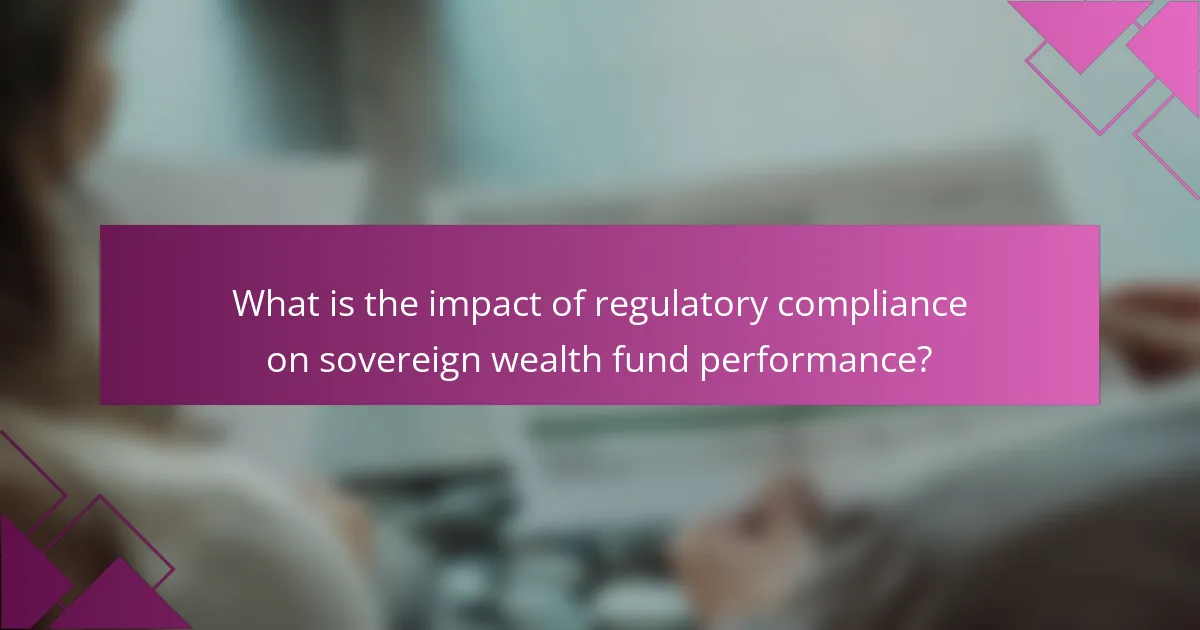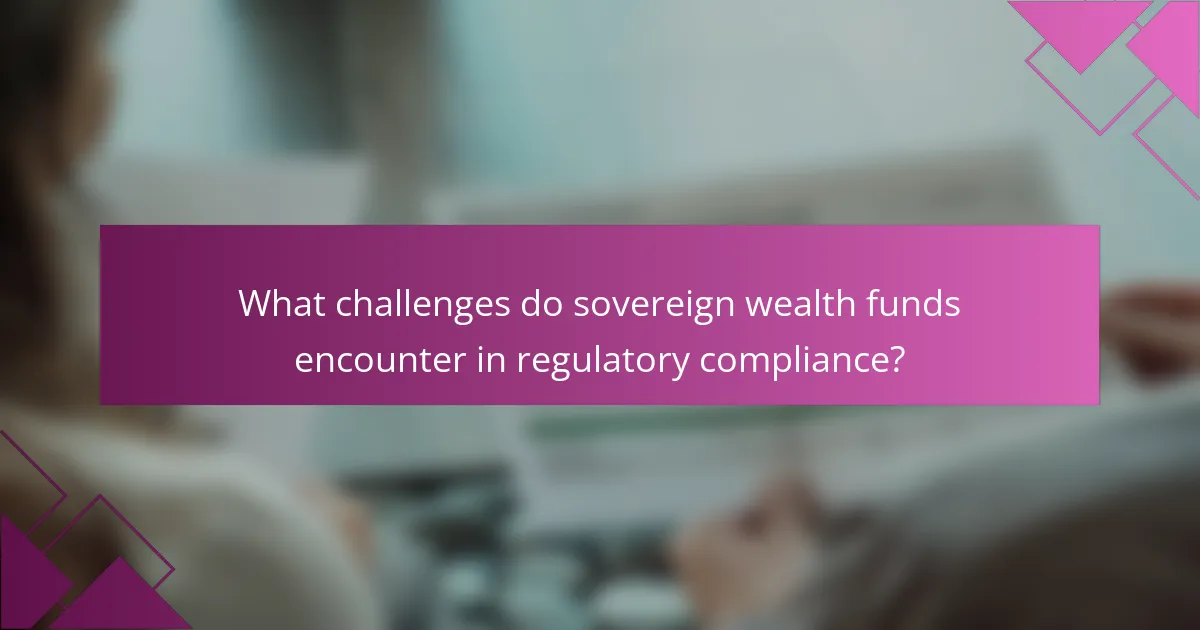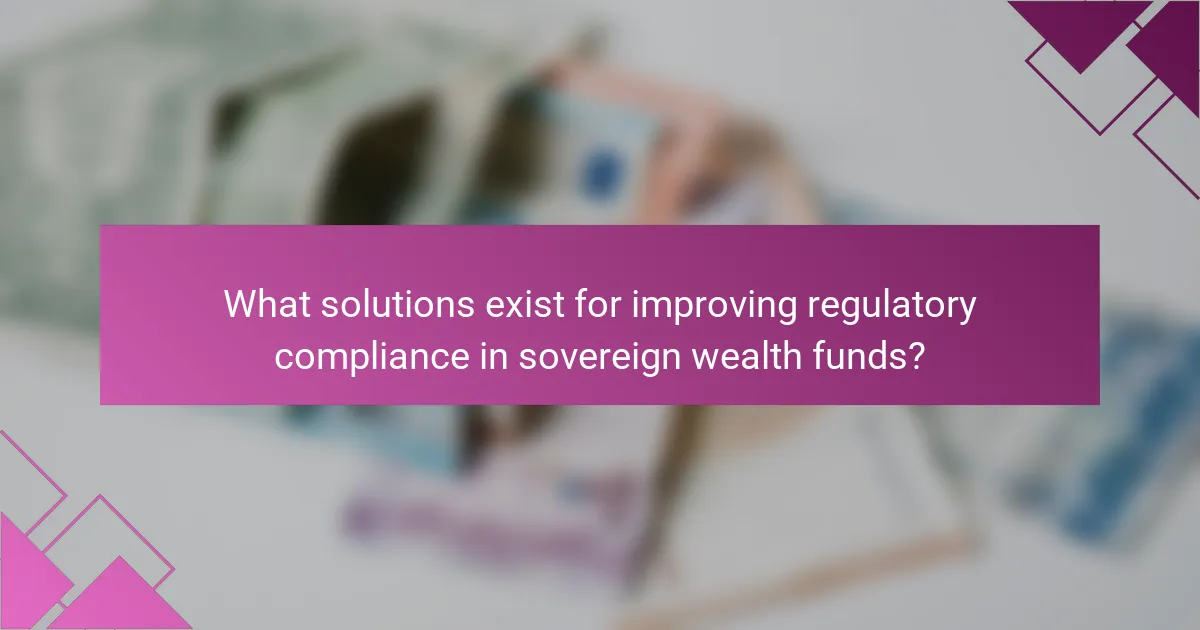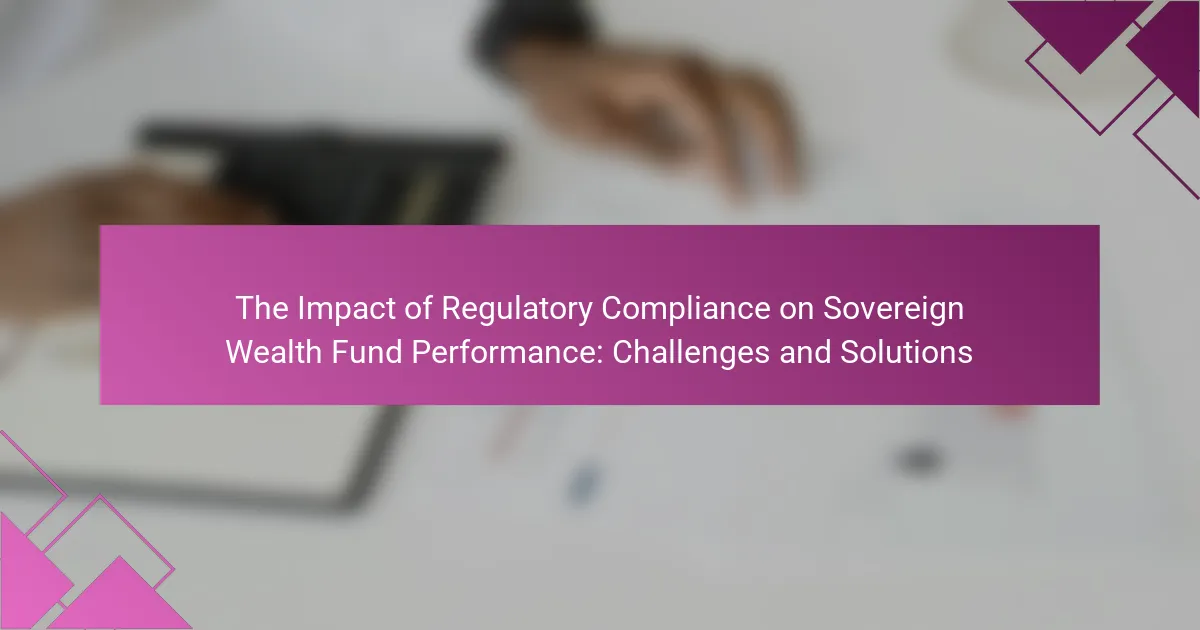
What is the impact of regulatory compliance on sovereign wealth fund performance?
Regulatory compliance significantly impacts sovereign wealth fund performance. Compliance ensures adherence to legal and ethical standards. This adherence enhances the fund’s credibility and trustworthiness. Trust is crucial for attracting investors and stakeholders. Non-compliance can lead to legal penalties and financial losses. A study by the International Monetary Fund highlights that compliant funds often achieve better long-term returns. Furthermore, compliance reduces operational risks and improves governance structures. Effective governance is linked to improved decision-making and investment strategies. Thus, regulatory compliance directly correlates with enhanced performance in sovereign wealth funds.
How does regulatory compliance influence the investment strategies of sovereign wealth funds?
Regulatory compliance significantly influences the investment strategies of sovereign wealth funds. Compliance mandates shape the risk tolerance and asset allocation of these funds. Sovereign wealth funds must adhere to national and international regulations. These regulations often dictate investment limits and permissible asset classes. As a result, funds may prioritize lower-risk investments. Compliance can also lead to increased transparency and accountability in reporting. This transparency affects investor confidence and may attract more capital. Additionally, regulatory frameworks can create barriers to entry for certain markets. Thus, sovereign wealth funds may adjust their strategies to navigate these challenges effectively.
What are the key regulatory frameworks affecting sovereign wealth funds?
The key regulatory frameworks affecting sovereign wealth funds include the Santiago Principles and various national regulations. The Santiago Principles were established in 2008 by the International Working Group of Sovereign Wealth Funds. These principles provide guidelines for the governance and investment practices of sovereign wealth funds. They aim to promote transparency, accountability, and good governance. National regulations vary by country and can include investment restrictions, reporting requirements, and compliance with international financial standards. Countries like Norway and Singapore have specific laws governing their sovereign wealth funds. These frameworks ensure that funds operate within legal boundaries and maintain public trust.
How do compliance requirements vary across different jurisdictions?
Compliance requirements differ significantly across jurisdictions. Each jurisdiction has its own regulatory framework and legal standards. For instance, the United States has a complex system with federal and state regulations. The European Union enforces directives that member states must adopt, leading to varied implementations. In contrast, jurisdictions like Singapore emphasize transparency and governance, shaping compliance expectations. Emerging markets may have less stringent regulations but face pressure from international standards. These variations impact how sovereign wealth funds operate globally. Understanding these differences is crucial for compliance strategies and performance optimization.
Why is regulatory compliance critical for the performance of sovereign wealth funds?
Regulatory compliance is critical for the performance of sovereign wealth funds because it ensures adherence to laws and regulations. Compliance helps mitigate legal risks that can lead to financial penalties. It also fosters transparency and accountability, which are essential for maintaining investor confidence. Sovereign wealth funds often manage substantial public assets, making adherence to regulations vital for public trust. Non-compliance can result in reputational damage, affecting future investment opportunities. Furthermore, regulatory frameworks often guide investment strategies, ensuring alignment with national economic goals. Effective compliance can enhance operational efficiency by streamlining processes and reducing the likelihood of costly legal disputes. Overall, regulatory compliance is essential for sustainable performance and long-term success of sovereign wealth funds.
What risks do sovereign wealth funds face without proper compliance?
Sovereign wealth funds face significant risks without proper compliance. These risks include legal penalties and fines from regulatory bodies. Non-compliance can lead to reputational damage, affecting stakeholder trust. It also increases the likelihood of operational disruptions. Additionally, lack of compliance can result in poor investment decisions. This may lead to financial losses and reduced returns. According to a 2021 study by the International Monetary Fund, non-compliance can decrease fund performance by up to 15%. Therefore, proper compliance is essential for mitigating these risks and ensuring sustainable fund performance.
How can regulatory compliance enhance the reputation of sovereign wealth funds?
Regulatory compliance can enhance the reputation of sovereign wealth funds by demonstrating transparency and accountability. When these funds adhere to regulations, they build trust with stakeholders. This trust is essential for attracting investors and partners. Compliance also mitigates risks associated with financial misconduct. A strong reputation can lead to better investment opportunities. For instance, funds that comply with international standards are often seen as more credible. This perception can result in favorable media coverage. Ultimately, a solid reputation can enhance the overall performance of sovereign wealth funds.

What challenges do sovereign wealth funds encounter in regulatory compliance?
Sovereign wealth funds face significant challenges in regulatory compliance. These challenges include varying international regulations that complicate cross-border investments. Different jurisdictions impose distinct reporting requirements and governance standards. This inconsistency can lead to compliance risks and increased operational costs. Additionally, the lack of transparency in some regions complicates adherence to global standards. Sovereign wealth funds must also navigate political pressures that may influence regulatory frameworks. Furthermore, evolving regulations require continuous updates to compliance strategies. These factors collectively hinder the effective management and performance of sovereign wealth funds.
What are the common compliance challenges faced by sovereign wealth funds?
Sovereign wealth funds face several common compliance challenges. These include navigating complex regulatory environments. Different jurisdictions impose varying rules on investments. Ensuring adherence to these diverse regulations can be resource-intensive. Transparency requirements are also a significant challenge. Sovereign wealth funds must disclose their investment strategies and performance metrics. This can lead to scrutiny from stakeholders and the public. Additionally, geopolitical risks can impact compliance. Changes in international relations may alter investment regulations. Lastly, the evolving landscape of anti-money laundering laws poses challenges. Sovereign wealth funds must implement robust measures to prevent illicit activities.
How do changes in regulations impact the operations of sovereign wealth funds?
Changes in regulations significantly impact the operations of sovereign wealth funds. These funds must adapt their investment strategies to comply with new legal requirements. Regulatory changes can affect asset allocation, risk management practices, and reporting obligations. For instance, stricter transparency rules may require funds to disclose more information about their investments. This can lead to increased scrutiny from stakeholders and the public. Additionally, changes in taxation laws can influence the net returns on investments. Historical data shows that regulatory shifts can lead to a re-evaluation of investment goals. Such adjustments affect overall fund performance and operational efficiency. Therefore, sovereign wealth funds must stay agile to navigate these regulatory landscapes effectively.
What are the financial implications of non-compliance for sovereign wealth funds?
Non-compliance for sovereign wealth funds can lead to significant financial implications. These funds may face hefty fines and penalties imposed by regulatory authorities. Non-compliance can also result in increased scrutiny from regulators, leading to higher operational costs. Additionally, poor compliance can damage the fund’s reputation, affecting investor confidence. A loss of investor trust may lead to reduced capital inflows. Furthermore, non-compliance can hinder the fund’s ability to diversify its investment portfolio effectively. Historical cases show that non-compliance can result in losses amounting to millions of dollars. For instance, fines in the range of $100 million have been reported for various financial institutions due to similar issues.
How do sovereign wealth funds manage compliance challenges effectively?
Sovereign wealth funds manage compliance challenges effectively through robust governance frameworks and risk management strategies. These funds establish clear compliance policies aligned with international regulations. They conduct regular audits to ensure adherence to these policies. Training programs for staff enhance awareness of compliance requirements. Collaboration with legal experts provides guidance on regulatory changes. Utilizing technology, such as compliance monitoring systems, streamlines compliance processes. Transparency in reporting builds trust with stakeholders. A proactive approach to identifying potential compliance risks mitigates issues before they arise. These strategies contribute to the overall performance and reputation of sovereign wealth funds.
What best practices can be adopted for regulatory compliance?
Adopting best practices for regulatory compliance involves implementing structured processes and regular training. Organizations should establish a compliance framework that aligns with relevant laws and regulations. Regular audits and assessments help identify compliance gaps. Documenting policies and procedures ensures clarity and consistency. Engaging stakeholders in compliance discussions fosters a culture of accountability. Utilizing technology can streamline compliance tracking and reporting. Continuous education and training keep staff informed of regulatory changes. Benchmarking against industry standards enhances compliance effectiveness. These practices contribute to improved performance and risk management in sovereign wealth funds.
How can technology aid in overcoming compliance challenges?
Technology aids in overcoming compliance challenges by automating processes and increasing efficiency. Automated systems can track regulatory changes in real-time. This ensures that organizations stay updated with compliance requirements. Furthermore, technology facilitates data management and reporting. It allows for accurate record-keeping, which is essential for audits. Advanced analytics can identify potential compliance risks before they escalate. Additionally, technology enables secure communication and documentation sharing. This reduces the risk of human error and enhances accountability. Therefore, leveraging technology is crucial for effective compliance management.

What solutions exist for improving regulatory compliance in sovereign wealth funds?
Solutions for improving regulatory compliance in sovereign wealth funds include implementing robust governance frameworks. These frameworks establish clear accountability and oversight mechanisms. Regular training programs for staff enhance understanding of regulatory requirements. Technology solutions, such as compliance management software, streamline monitoring and reporting processes. Engaging with regulatory bodies fosters transparency and builds trust. Conducting regular audits identifies compliance gaps and areas for improvement. Collaborating with external advisors provides expertise and best practices. These strategies collectively strengthen compliance and mitigate risks associated with regulatory failures.
What role do governance frameworks play in enhancing compliance?
Governance frameworks play a critical role in enhancing compliance by establishing clear policies and procedures. They provide a structured approach to managing regulatory requirements. This structure helps organizations understand their obligations and the necessary steps to meet them. Effective governance frameworks promote accountability and transparency. They ensure that compliance is integrated into the organizational culture. Research shows that organizations with robust governance frameworks experience fewer compliance violations. This is due to increased awareness and adherence to regulations. Furthermore, a well-defined governance framework can facilitate better risk management. It allows organizations to proactively address potential compliance issues before they escalate.
How can training and awareness programs improve compliance understanding?
Training and awareness programs enhance compliance understanding by providing essential knowledge and skills. These programs educate employees about regulatory requirements and organizational policies. They clarify the implications of non-compliance, reducing risks associated with penalties. Interactive training methods, such as workshops and simulations, engage participants effectively. This engagement fosters retention of information and practical application in real scenarios. Research by the Compliance and Ethics Institute indicates that organizations with comprehensive training programs see a 50% reduction in compliance violations. Therefore, structured training initiatives significantly contribute to improved compliance comprehension.
What partnerships can sovereign wealth funds pursue to strengthen compliance efforts?
Sovereign wealth funds can pursue partnerships with regulatory bodies and compliance organizations to strengthen compliance efforts. Collaborating with international regulatory agencies enhances understanding of global compliance standards. Engaging with legal firms specializing in compliance ensures adherence to local and international laws. Partnering with financial institutions provides insights into best practices in risk management. Additionally, alliances with academic institutions can foster research on compliance trends. These partnerships create a framework for sharing knowledge and resources. Evidence shows that funds with strong compliance frameworks perform better and face fewer legal challenges.
What are the future trends in regulatory compliance for sovereign wealth funds?
Future trends in regulatory compliance for sovereign wealth funds include increased transparency and enhanced reporting requirements. Regulatory bodies are emphasizing the need for clearer disclosures regarding investment strategies and risk management practices. This shift aims to build trust with stakeholders and the public. Additionally, there will be a greater focus on sustainable investment practices. Regulations are evolving to incorporate environmental, social, and governance (ESG) criteria into compliance frameworks.
Furthermore, technology will play a crucial role in compliance monitoring. The adoption of advanced analytics and blockchain can streamline reporting processes. Regulatory technology, or RegTech, will help funds comply with evolving regulations more efficiently. Global collaboration among regulators will also increase, creating standardized compliance frameworks across jurisdictions.
These trends indicate a move towards more proactive and integrated compliance strategies in sovereign wealth funds. As regulations continue to evolve, funds must adapt to maintain performance and meet stakeholder expectations.
How might global regulatory changes affect sovereign wealth fund operations?
Global regulatory changes can significantly impact sovereign wealth fund operations. These changes may alter investment strategies and asset allocation. For instance, stricter compliance requirements can limit the types of investments funds can pursue. Funds might face increased reporting obligations, which can lead to higher operational costs. Regulatory changes can also affect cross-border investments, influencing market access. In some cases, new regulations may promote transparency, enhancing investor confidence. Historical examples show that shifts in regulations often lead to adjustments in fund management practices. In 2008, the financial crisis prompted many countries to revise regulations affecting sovereign wealth funds, leading to more cautious investment approaches.
What innovative approaches are being developed for compliance in the financial sector?
Innovative approaches for compliance in the financial sector include the use of artificial intelligence and machine learning. These technologies analyze vast amounts of data to identify potential compliance risks. Automation tools streamline reporting processes and reduce human error. Blockchain technology enhances transparency and traceability in transactions. RegTech solutions provide real-time monitoring of regulatory changes. Data analytics tools help firms assess their compliance posture effectively. These innovations aim to improve efficiency and reduce costs associated with compliance activities.
What practical steps can sovereign wealth funds take to ensure compliance success?
Sovereign wealth funds can ensure compliance success by implementing robust governance frameworks. Establishing clear compliance policies is essential. These policies should align with international regulations and local laws. Regular training programs for staff enhance awareness of compliance requirements. Conducting periodic audits identifies potential compliance gaps. Engaging external advisors can provide expertise in complex regulatory environments. Utilizing advanced compliance technology streamlines monitoring and reporting processes. Lastly, fostering a culture of transparency promotes accountability within the organization.
The main entity of this article is regulatory compliance in relation to sovereign wealth fund performance. The article explores the significant impact of regulatory compliance on the performance of sovereign wealth funds, emphasizing its role in enhancing credibility, trust, and long-term returns. Key topics include the influence of compliance on investment strategies, the various regulatory frameworks governing these funds, and the challenges faced in maintaining compliance across different jurisdictions. Additionally, it discusses the financial implications of non-compliance, best practices for effective management, and future trends in regulatory compliance for sovereign wealth funds.
